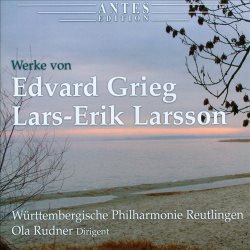|

|
Edvard GRIEG (1843-1907)
Peer Gynt, Suite No. 1 op. 46 (1888) [16:22]
Peer Gynt, Suite No. 2 op. 55 (1893) [17:36]
Aus Holbergs Zeit op. 40 (1884) [22:03]
Lars-Erik LARSSON (1908-1986)
Pastoral-Suite op. 19 (1938) [13:42]
Württembergische Philharmonie/Ola Rudner.
rec. 21-24 May, 2013 (Grieg), 22-23 Jul., 2013 (Larssson), Reutlingen.
ANTES EDITION BM 319288 [69:51]
Edvard Grieg’s incidental music to Henrik Ibsen’s 1867 play Peer Gynt as reflected in Suite No. 1 op. 46 is one of the most instantly recognisable compositions of the classical repertoire. Upon the express request of Ibsen, Grieg wrote a score for his verse drama, which tells a story of the downfall and redemption of a Norwegian peasant anti-hero. It negotiates the paths between reality and fantasy. Perhaps best thought of as Norway’s musical voice, Grieg’s Peer Gynt forms the soundtrack of his beloved country. Grieg himself once explained that ‘The traditional way of life of the Norwegian people, together with Norway’s legends, Norway’s history, Norway’s natural scenery, stamped itself on my creative imagination from my earliest years’.
As a work of ‘witchery’ and ‘permeated with the Norwegian spirit’ (according to Grieg), Ola Rudner brings out the multifarious colours and textures from the work’s patchwork-style. Thus, whilst the quiet passages closing The Death of Ase are subtle yet penetrating, the frivolous pizzicato waltz rhythm of Anitra’s Dance charms and delights. Replete with the bombast and brassiness of In the Hall of the Mountain King, which contrasts with the initial pastoral lyricism of Morning Mood, the Württembergische Philharmonie delivers both a sumptuously flirtatious and seriously focused performance.
In Suite No. 2 op. 55, influenced by Ottoman Janissary music and familiar hometown sounds, Grieg negotiates between the Sahara desert (Arabian Dance), stormy seas (Peer Gynt’s Homecoming) and heartfelt Norwegian folk music (Solveig’s Song). With such a varied range of emotions and settings, it is no wonder that when describing the difficulties of composition Grieg wrote to a friend in August 1874 that ‘Peer Gynt progresses slowly […] it is a terribly unmanageable subject’. In the Arabian Dance in particular, percussion, strings and brass unite until the warmth of cellos overrides the fragmentary spontaneity of syncopated melodies and ostinato rhythms. Along with woodwind arabesques and the jostling of strings and percussion, Rudner flavours this dance with peppery notes and a great sense of vitality.
Whether you find his music like ‘bonbons wrapped in the snow’ (as Debussy quipped) or as a composer with ‘warmth and passion in his melodic phrases, […] teeming vitality in his harmony [and] originality and beauty in the turn of his piquant and ingenious modulations and rhythms [with] that rarest of qualities, a perfect simplicity’ (as Tchaikovsky once praised); it is irrefutable that in the culminating Solveig’s Song warmth and passion come together with a resounding clarity that characterises this entire recording.
Subtitled ‘Suite in olden style’, Grieg’s Holberg Suite consists of five movements based on the French dance forms of the baroque suite. Originally written to commemorate the 200th anniversary of Ludvig Holberg’s birth, the style is classical and reserved. Summing up Holberg’s position, the Norwegian poet Welhaven described him as ‘a gem with a precious gleam’ who ‘shall live in high and old esteem’. It seems as though Grieg’s composition, in its respectful and noble sound, coincides with this impression of Holberg. Opening with a sprightly Preludium, a more self-reflexive Sarabande follows where noticeably sonorous cello solos based on the predominantly melancholic theme can be fully appreciated. The Gavotte is slightly prim and prissy, but the slow steadiness of the Air quietens and restrains the previously carefree section. Finishing with a thriving Rigaudon this charming Suite is played with a punchy vitality mixed with pondering contemplativeness by the Württembergische Philharmonie.
Swedish composer, Lars-Erik Larsson’s Pastoral-Suite
cheerfully opens with a decisively Sibelian Overture. The
orchestra remains sharp and moves with precision. A composition consisting
of three movements (fast-slow-fast), it is reminiscent of an early
(pre-classical) symphony in its structure. Scored for strings
alone, the Romance in E flat is romantically saturated; perhaps
a little too lavish in its impassioned approach, Rudner encourages
an unashamedly confessional sound. This is pithily contrasted with
the brilliantly sparkling Scherzo, where the woodwind enters
into fluttering birdsong territory. In this light-footed finale the
playing has both definition and tenderness. It all sounds comely and
welcoming.
Lucy Jeffery
 |
 |
|











